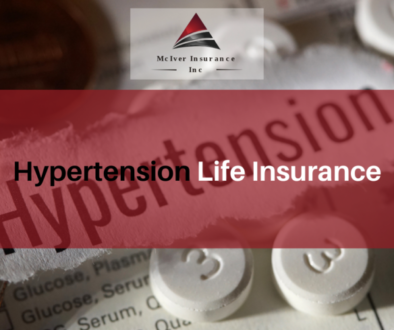What Are The Top Factors That May Affect Your Life Insurance Premium?
Life insurance coverage is widely popular in Canada because it is an essential financial tool that helps Canadians protect their loved ones financially – in the event of their untimely demise. It is estimated that nearly 70% of Canadian households are covered by either individual or group health insurance plans
While most Canadian households have life insurance coverage, not all Canadians pay the same in premiums. This is because several factors can impact how much an individual has to pay in premiums on a per-month or annual basis. Top factors include biometrics, physical and mental health, family medical history, and lifestyle choices.
Canadians who pay lower premiums for similar insurance policies can essentially save quite a lot of money during the duration of their life insurance term. This is why it is essential that when looking to purchase life insurance you take every step possible to lower the cost of premiums you will be liable to pay.
In this article, we will look at the factors that impact premiums and also provide tips and advice on how you can lower your life insurance premiums using holistic approaches.
6 Top Factors That Affect Your Life Insurance Premium
Determining what premium an individual is subject to pay for their life insurance policy is done by an actuary during the underwriting process. They consider several factors that help them calculate the insurance risks and determine what a safe insurance premium would be to cover those risks. So, the lesser the associated risks, the lower the premium quotes are likely to be from life insurance providers.
To help you make the best case possible for your life insurance coverage, here are the top 6 factors that hold the most weight during the underwriting process.
The Individual’s Age & Gender
This is a factor that is beyond the control of individuals applying for life insurance coverage but plays a major factor in determining the cost of life insurance premiums.
In terms of gender, statistically, females are likely to live five years, on average, longer than males. As such, premiums for females tend to be lower than for males.
The other crucial factor is age. The younger you are the cheaper your premiums. As insurance is essentially probability, the chances of you falling ill or getting fatally injured while you are young are a lot less than when you are older. Younger people have longer life expectancies and are generally in better health.
The cost of life insurance premiums can increase by 8%-10% on average for every year of age. This is why, to get the lowest premiums possible, it is best to get life insurance coverage at a young age.
Term life insurance policies are also excellent options for young Canadians wanting to safeguard their loved ones financially. With term life insurance your premiums remain the same every year, which if you start young, can amount to substantial savings.
Getting life insurance as you get older can also become a lot harder. Sometimes, if you are over a certain age, you may not even be able to qualify for life insurance. You will also likely have to undergo qualifying medical exams that can get tougher to pass the more you age.
Overall Physical & Mental Health History
Most health insurance providers will require you to take a medical exam when applying for life insurance. This is an essential part of the underwriting process. While you may find providers that don’t require a medical exam, these providers will likely charge much higher premiums that are well over competitive rates.
A medical exam will include taking your biometrics and checking your vitals. This includes measuring your height and weight and other vital metrics such as blood pressure and cholesterol levels. Some providers might even require an electrocardiogram (ECG) to access your heart health.
Your health history is also taken into account. Doctor visitations, vaccinations, and hospitalization visits are all looked at during the underwriting process.
Smoking & Drinking Habits
Smoking and excessive drinking can result in many health problems down the line. As such, smokers are generally always given higher premiums as compared to non-smokers. Twice as much, in many cases.
An insurance provider will qualify you as a smoker even if you occasionally smoke cigarettes, cigars, and/or vapes. As such, before applying for individual insurance coverage make sure you quit smoking. Otherwise, be prepared to pay high premiums!
It would be tempting for occasional smokers to lie and say they don’t smoke. However, beware! If you are found smoking, your policy will be automatically terminated and you won’t receive any benefits. It will also become a lot harder for you to get another insurance policy at any sort of competitive rate.
Lifestyle & Profession
Your lifestyle and profession can both play a role in determining how much life insurance premium you pay. If you enjoy dangerous hobbies such as racing cars, rock climbing, deep sea diving, or even skydiving you are likely looking at much higher premiums for insurance coverage.
The same is the case when it comes to your profession. Individuals with dangerous professions such as race car drivers, police officers, miners, zoo keepers, heavy machine operators, and construction workers are likely going to pay more for life insurance than those with white-collar desk jobs.
Family Medical History
Another uncontrollable factor that can affect your life insurance premium is your family medical history.
Those that have a family medical history of strokes, cancer, diabetes, and other serious medical conditions that have resulted in premature death, are likely to receive higher insurance premium quotes even though they are healthy and show no signs of any ailment or illness.
Driving Record
Some insurance providers may even look into your driving history to see if you have any speeding violations or a history of road accidents. Usually, a three to five-year track record is looked at.
So even if you started with a poor driving record, if you have improved over the years this would look good for your application.
The Best Ways To Lower Your Insurance Premiums!
There are many ways that can help you lower the premiums you pay for life insurance coverage. Living a healthy lifestyle is one. If you maintain good health and refrain from smoking and excessive drinking you can help bring down your insurance premium quotes. Also, if you have dangerous hobbies or interests, stop doing them. This could also be contributing to your high cost of premiums.
However, the best way to pay lower premiums is to consult with a financial or insurance advisor, such as the ones at McIver Insurance. We can help determine whether life insurance coverage is the right fit for your situation, investment goals, and future financial plans and if so find a policy that works for you.
Our advisors can also discuss ways you can lower your premium costs to get the best coverage possible at the lowest premium possible.
Give us a call at 1-902-220-3279 to learn more!



